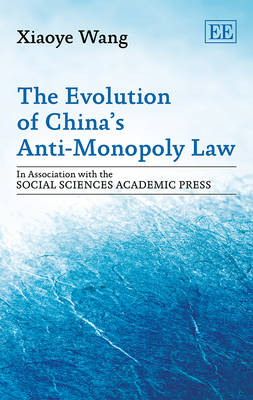
The Evolution of China’s Anti-Monopoly Law
Edward Elgar Publishing Ltd (Verlag)
978-1-78195-249-8 (ISBN)
This is an extraordinary collection of essays, most previously available only in Chinese, by the leading world authority on China's Anti-Monopoly Law. They are necessary reading for a holistic understanding of the law as a unique product of its history, its purposes and foundations, and its early applications. Probably no other scholar could produce such a thoughtful, clear, and both theoretically and practically helpful collection.'
- Eleanor M. Fox, New York University School of Law, USChina's Anti-Monopoly Law (AML) is one of the youngest and most influential antitrust laws in the world today. This book aims to provide a better understanding of the evolution of China's AML to the international community, through a collection of essays from the most prominent antitrust scholar in China, Professor Xiaoye Wang.
Xiaoye Wang provides a unique and invaluable 'insider perspective' into how China and its incipient antitrust regime work. This book therefore serves as a key reference text, which comprehensively outlines the historical background of China's enactment of the AML, engages in comparative legal analysis to explain the basic contents of the law, analyses its existing problems, and considers the various challenges it will face in implementation. This book also records the AML's difficult legislative journey, and reflects upon the views and different perspectives that the Chinese society has on the market economy, market competition, and other important theoretical questions.
Antitrust practitioners and in-house lawyers, academics and policymakers alike will be interested in this book. China has become too important an antitrust jurisdiction, and too important a market, for any person with an interest in antitrust to ignore.
Contents:
1. Why Needs China Anti-Monopoly Law?
2. Anti-monopoly Law and Building a Harmonious Society
3. Anti-monopoly Law and China's Economic Reform
4. Market Access of the Non-Public Economy and Anti-Monopoly Law
5. Legal Suggestions for Reforming Monopoly Industries
6. China's Competition Law in the Global Competition
7. The Impacts of the WTO Competition Policy Negotiation in China
8. WTO Accession and the Formulation of China s Anti-Monopoly Law
9. The Prospect of Anti-monopoly Legislation in China
10. The Goals of China s Anti-Monopoly Law
11. Anti-Monopoly Law and Industry Price Self-Discipline
12. Anti-Monopoly Regulation of the Market Behaviour of Public Utility Enterprises
13. The Legal Regulation of Administrative Restrictions on Competition
14. Anti-Monopoly Law in the Compulsory Licensing of Intellectual Property
15. Some Issues Surrounding the Anti-Monopoly Enforcement Authority in China
16. Issues Surrounding the Drafting of China's Anti-monopoly Law
17. Unfair Competition and Anti-Competition
18. Comments on Merger Control under China's Anti-monopoly Law
19. Highlights of China's New Anti-monopoly Law
20. Analysis and Comment on China's Anti-Monopoly Law
21. China's Anti-monopoly Enforcement Agency Should Say No to the BHP-Rio Tinto Merger
22. Comments on MOFCOM's Decision on Coca-Cola/Huiyuan
23. Reflections on the NDRC Case Against China Telecom and China Unicom
4. China's Anti-Monopoly Law for Three Years: Achievements and Challenges
Index
Xiaoye Wang, Professor of Hunan University and Chinese Academy of Social Sciences and Consultative Expert for the Anti-Monopoly Commission under the State Council of the People’s Republic of China
Contents: 1. Why Needs China Anti-Monopoly Law? 2. Anti-monopoly Law and Building a Harmonious Society 3. Anti-monopoly Law and China’s Economic Reform 4. Market Access of the Non-Public Economy and Anti-Monopoly Law 5. Legal Suggestions for Reforming Monopoly Industries 6. China’s Competition Law in the Global Competition 7. The Impacts of the WTO Competition Policy Negotiation in China 8. WTO Accession and the Formulation of China’s Anti-Monopoly Law 9. The Prospect of Anti-monopoly Legislation in China 10. The Goals of China’s Anti-Monopoly Law 11. Anti-Monopoly Law and Industry Price Self-Discipline 12. Anti-Monopoly Regulation of the Market Behaviour of Public Utility Enterprises 13. The Legal Regulation of Administrative Restrictions on Competition 14. Anti-Monopoly Law in the Compulsory Licensing of Intellectual Property 15. Some Issues Surrounding the Anti-Monopoly Enforcement Authority in China 16. Issues Surrounding the Drafting of China’s Anti-monopoly Law 17. Unfair Competition and Anti-Competition 18. Comments on Merger Control under China’s Anti-monopoly Law 19. Highlights of China’s New Anti-monopoly Law 20. Analysis and Comment on China’s Anti-Monopoly Law 21. China’s Anti-monopoly Enforcement Agency Should Say No to the BHP-Rio Tinto Merger 22. Comments on MOFCOM’s Decision on Coca-Cola/Huiyuan 23. Reflections on the NDRC Case Against China Telecom and China Unicom 24. China’s Anti-Monopoly Law for Three Years: Achievements and Challenges Index
| Verlagsort | Cheltenham |
|---|---|
| Sprache | englisch |
| Maße | 156 x 234 mm |
| Themenwelt | Recht / Steuern ► EU / Internationales Recht |
| Recht / Steuern ► Wirtschaftsrecht ► Wettbewerbsrecht | |
| ISBN-10 | 1-78195-249-3 / 1781952493 |
| ISBN-13 | 978-1-78195-249-8 / 9781781952498 |
| Zustand | Neuware |
| Haben Sie eine Frage zum Produkt? |
aus dem Bereich


